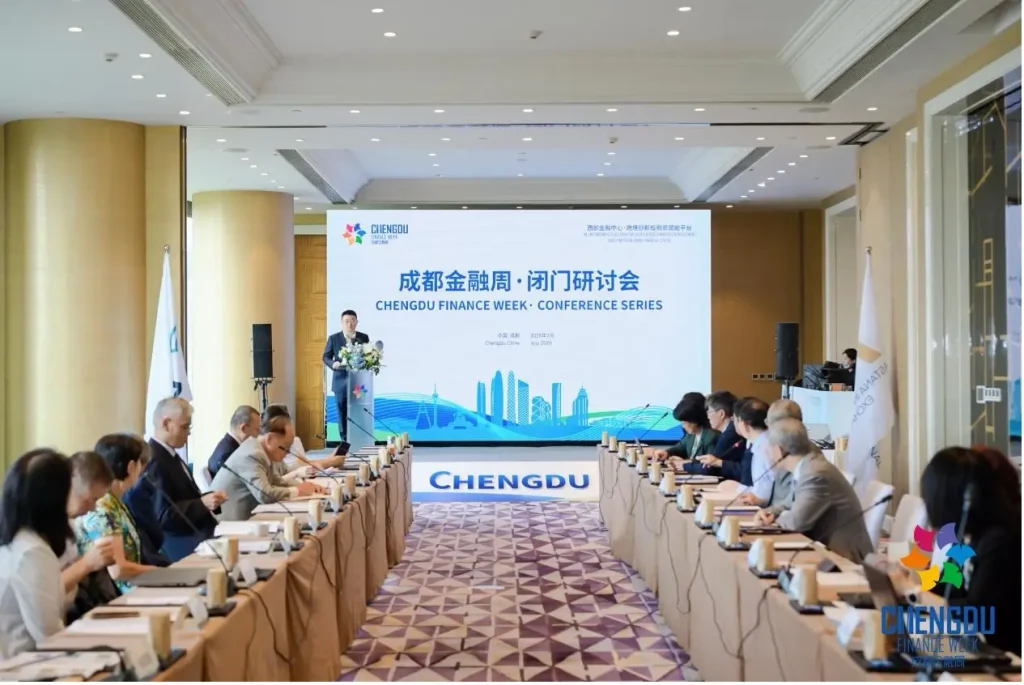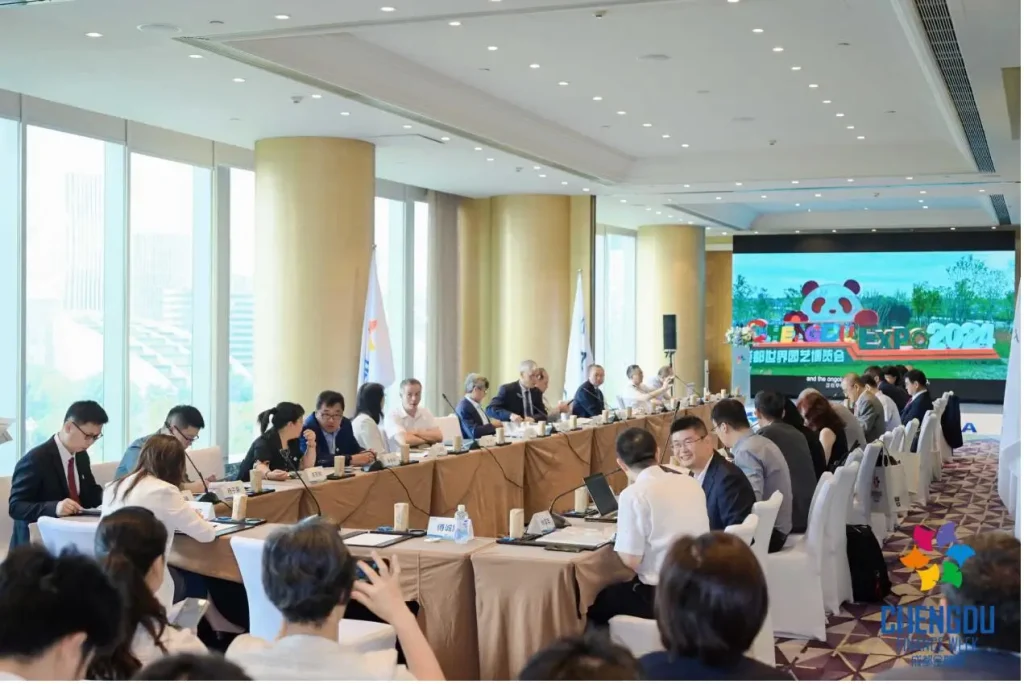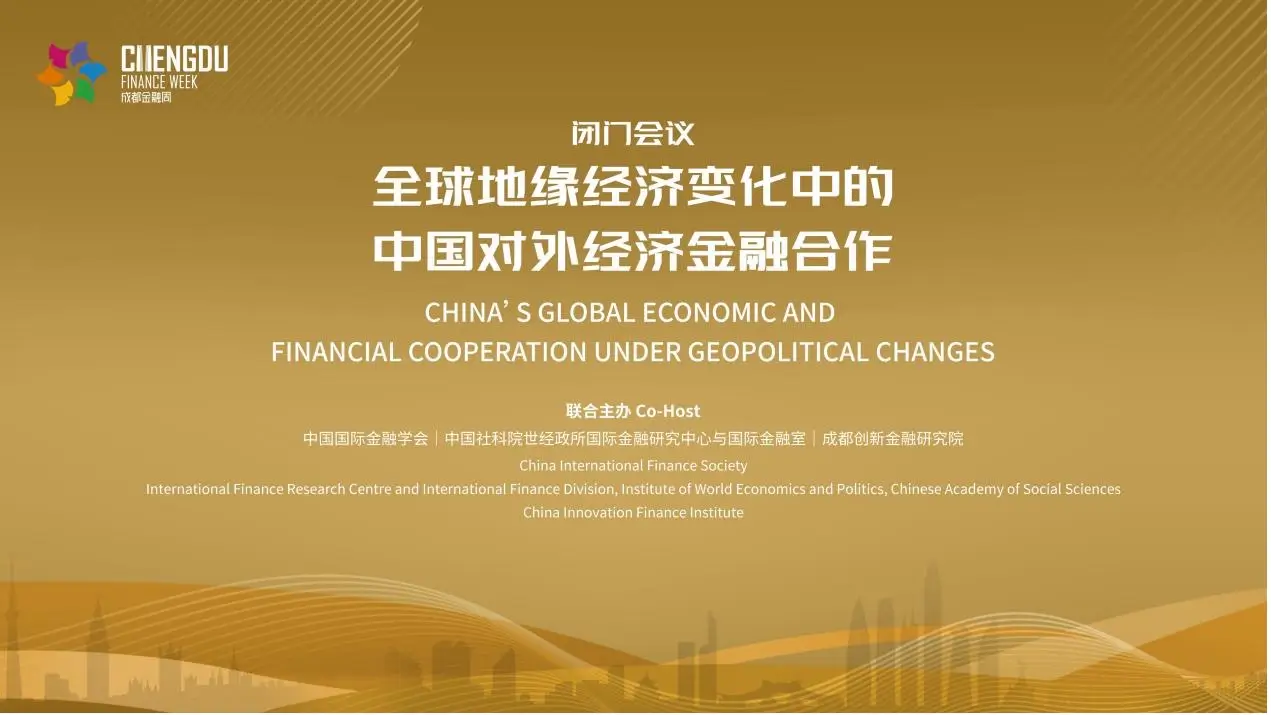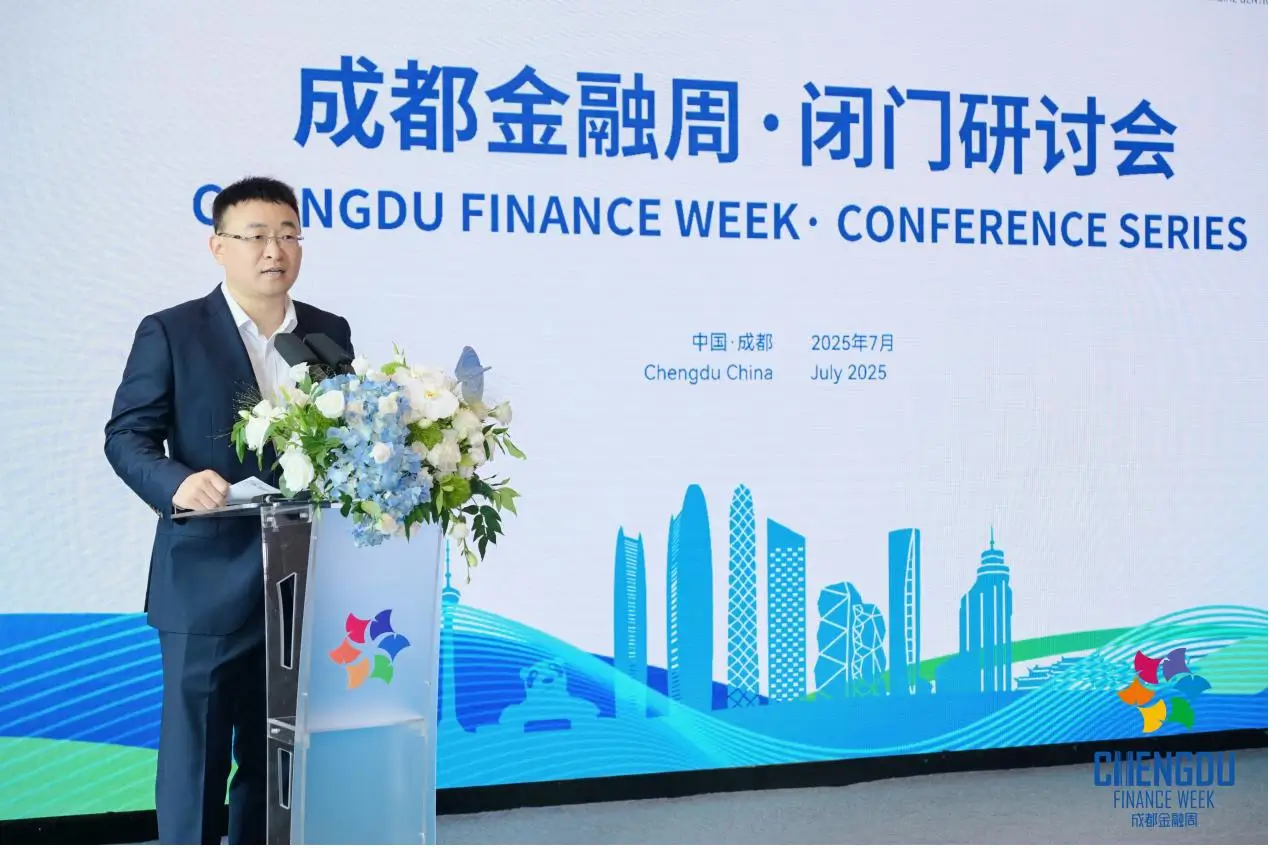On July 10, 2025, the “Chengdu Finance Week · Conference Series” was successfully held, hosted by the China Innovation Finance Institute | Chengdu and jointly guided by leading national think tanks and associations, including the China Society of World Economics, China International Finance Society, China Association for the Promotion of Development Financing, Chinese Association of Middle East Studies, and China Reform Forum.


The seminar focused on two major themes: “China’s Global Economic and Financial Cooperation under Geopolitical Changes” and “China-Gulf Innovation Investment: Opportunity, Challenge and Strategy” It offered in-depth discussions on the opportunities and challenges facing China’s outbound investment and financing in the context of an evolving global economic landscape.
Bringing together influential experts from the fields of finance, investment, and policy, the seminar aimed to discuss international cooperation paths for China’s financial liberalization and the synergistic development of the western region.
Distinguished Guests Share Insights on the Future of Financial Development
Xiqing Gao, Former Vice Chairman of the China Securities Regulatory Commission (CSRC), Former Vice Chairman and President of China Investment Corporation (CIC), Former Vice Chairman of the National Council for Social Security Fund (SSF), and Mingshe Guo,Vice Chairman and Secretary-General of China Association for the Promotion of Development Financing, delivered opening remarks at the Conference Series.
In his speech, Xiqing Gao noted that under the current wave of globalization, the emerging “new economic paradigm”— shaped by complex geopolitical dynamics, global uncertainty, and rapid technological disruption—is no longer characterized by traditional cyclical fluctuations. Instead, he emphasized that financial systems must adapt to and address the long-term structural impacts brought about by these changes.
Mingshe Guo highlighted that, through years of practical experience, the China Association for the Promoting of Development Financing has established a mature model characterized by a “government-led entry, development finance incubation, and market-oriented exit.” This approach effectively channels financial resources toward key areas of high-quality national development. In particular, development finance has played a pioneering and leading role in industrial upgrading, technological innovation, and international financial cooperation.
The two experts are optimistic about Chengdu’s significant role and huge potential in China’s economic development and the new pattern of opening up to the outside world.
In the keynote session, Yuyan Zhang, Member of the Chinese Academy of Social Sciences (CASS), and President of the China Society of World Economy, analyzed in depth the important trend of how security needs are rapidly overtaking purely economic and financial needs under the current huge geopolitical changes, as well as the strategic intention of the United States to consolidate the dollar system through the layout of the security field.
Mengzi Fu, Former Vice President of the China Institutes of Contemporary International Relations (CICIR), said that Chengdu should give full play to its geographic location advantages facing Southeast Asia, South Asia, the Middle East, and Central Asia; actively develop advanced manufacturing and financial services; take advantage of the policy dividend of the National Artificial Intelligence Innovation Demonstration Zone; and promote the in-depth integration of blockchain and AI technologies with inclusive and green finance to foster a virtuous cycle among technology, industry, and capital—ultimately better serving China’s Belt and Road Initiative.
Weidong Chen, President of the Bank Of China Research Institute, and Secretary-General of the China International Finance Society, emphasized that the international monetary system is at a historic crossroads. He argued that the current model dominated by a single sovereign currency is becoming increasingly unsustainable. Looking ahead, he predicted the emergence of a more diversified currency system composed of the U.S. dollar, the euro, and the Chinese yuan. Such a structure, he noted, would be better aligned with the evolving distribution of global economic and geopolitical power.
In his keynote speech, Hubertus Väth, Managing Director of Frankfurt Main Finance (FMF), spoke on the construction and maintenance of trust mechanisms within financial markets. He elaborated on how Frankfurt has enhanced market transparency and efficiency through standardization and digitalization, and how cross-border cooperation is essential for building and sustaining long-term trust in the global financial system. He highly valued Chengdu’s positive stance in the global financial network and pointed out that Chengdu has already won the trust of a wide range of people, including Frankfurt, and expressed his firm confidence in Chengdu’s deepening international financial cooperation.
Two Conference Seriess Focus on Pressing Global Issues
The first Conference Series, themed “China’s Global Economic and Financial Cooperation under Geopolitical Changes”, was jointly hosted by the China International Finance Society, International Finance Research Centre and International Finance Division, Institute of World Economics and Politics, Chinese Academy of Social Sciences, and the China Innovation Finance Institute | Chengdu.
Participants included Weidong Chen, Dean of the Academy of Bank of China; Geng Xiao, Associate Dean for International Cooperation of School of Public Policy, Chinese University of Hong Kong, Shenzhen; Min Song, Dean of the Institute of Central China Development at Wuhan University; Ran Tao, Presidential Chair Professor of Development and Governance in the School of Humanities and Social Science at CUHK (Shenzhen); Haihong Gao, Director at the International Finance Research Centre, Institute of World Economics and Politics, CASS; Panpan Yang, Director of the International Finance Research Division, Institute of World Economics and Politics, CASS; Dongmin Liu, Deputy Director of the International Finance Research Centre, Institute of World Economics and Politics, CASS; Zirong Yang, Associate Professor at the Department of Global Macroeconomy, Institute of World Economics and Politics, Chinese Academy of Social Sciences (CASS); Hefei Wang, Associate Dean of Academic Engagement at the International Business School Suzhou (IBSS), Xi’an Jiaotong-Liverpool University; Calvin, Chenggang Fu, Chairman of the China Innovation Finance Institute | Chengdu; Rui Ma, Research Officer; and Jun Huang, Program Officer at the China Innovation Finance Institute | Chengdu.
More than 80 representatives from Chengdu government departments, financial institutions, enterprises, and university think tanks attended the session. The forum featured in-depth discussions on topics including the restructuring of the global monetary system, currency choices in a “post-dollar era,” new pathways for the RMB Internationalization, the evolution of global innovation networks and China’s rise within them, and Chengdu’s strategic role in the reconfiguration of global industrial chains.

Geng Xiao shared his insights on Chengdu–Hong Kong cooperation. He believed that Hong Kong should strengthen its role as a hub in China’s external circulation system through mechanisms such as the “dual-headquarters” model and the concept of a “super economic zone”, while inland cities like Chengdu could accelerate their internationalization by establishing second headquarters dedicated to offshore business operations.
Min Song pointed out that China is moving from the periphery to the core of global innovation networks. He outlined a “3+1” model—comprising trade, FDI, talent mobility, plus policy support—as the driving force behind China’s rising global influence. In the future, China should deepen the “Belt and Road” scientific and technological cooperation, promote the export of technology standards, participate in the global innovation ecosystem as a “global brain,” leveraging digitalization and green development to leapfrog existing models.
Ran Tao reflected on China’s historical “3-2-1” economic growth model and stressed the urgent need to break monopolies on production factors, continue institutional reforms, and enable a smooth transition in the real estate market, so as to release the potential of residents’ assets and stabilize the economic fundamentals.
Haihong Gao pointed out that frequent geopolitical shocks and economic sanctions are reshaping global perceptions of financial asset safety. The traditional status of U.S. dollar-denominated assets as safe havens is being undermined, presenting a critical window of opportunity for the Chinese yuan amid the reconfiguration of the global geoeconomic order.
Panpan Yang, noted that RMB Internationalization is accelerating, driven by the expansion of cross-border settlement scenarios, realignment of global supply chains, and the growing dynamism of offshore markets. She emphasized that the weakening safe-haven appeal of U.S. Treasury bonds, coupled with a shift in investor structures, is opening up opportunities for a more diversified international monetary system, and RMB is becoming an important alternative option for emerging markets.
Dongmin Liu stressed that Web 3.0 and stablecoins are fundamentally transforming global financial infrastructure and monetary systems. Their core value lies not only in enhancing the efficiency and security of cross-border payments but also in reconstructing the architecture of global digital currency networks and financial ecosystems.China should accelerate the layout of RMB-anchored stablecoins and actively promote the creation of a Web 3.0–based cross-border e-commerce and platform economy framework to strengthen its influence and leadership in the emerging digital finance landscape.
Zirong Yang observed that while the U.S. economy is experiencing short-term disruptions, it has not yet entered a full-scale recession, and future growth may be due to Trump’s policies to bring downward pressure, particularly in areas such as tariffs and immigration, which could trigger a “quasi-stagflation” scenario. He also noted that the ongoing U.S.-China technological rivalry and evolving geopolitical landscape are reshaping the global economic order, with growing concerns over increasing fragmentation worldwide.
Hefei Wang pointed out that despite downward pressure on the Chinese economy, the asset management industry continues to grow. She believes that while Chinese private equity funds tend to exhibit a “buy-high, sell-low” pattern, they also demonstrate a strong ability to mitigate risk during economic downturns—highlighting their unique value as counter-cyclical investment instruments.
Second Conference Seriess: “China-Gulf Innovation Investment Symposium: Opportunities, Challenges and Strategies”
The second Conference Seriess, titled “China-Gulf Innovation Investment: Opportunities, Challenge and Strategy,” was co-hosted by the Chinese Association of Middle East Studies and the China Innovation Finance Institute | Chengdu.
Distinguished attendees included: Sike Wu, Member on the Foreign Policy Consulting Committee of the Ministry of Foreign Affairs, Former China’s Special Envoy on the Middle East Issue, Former Chinese Ambassador to Saudi Arabia, and Former Ambassador of China to Egypt and Authorized Representative of Chinese Mission to the Arab League; Lincong Wang, President, Chinese Association of Middle East Studies, Deputy Director-general, Institute of West-Asian and African Studies (IWAAS), Chinese Academy of Social Sciences (CASS), and Director of the Gulf Research Center of the CASS; Xinchun Niu, Academic Vice President at Ningxia University, Vice President of the Chinese Association of Middle East Studies; Zhichao Tang, Vice President and Secretary General of the Associate of Chinese Middle East Studies;
Baizhi Liao, Director and Professor of the CICIR Institute of Middle East Studies; Xiaojing Mao, Director of the Institute of West Asian and African Studies at the Chinese Academy of International Trade and Economic Cooperation, Ministry of Commerce; Quangang Zhu, Vice Secretary General, Chinese Association of Middle East Studies; Deputy Director of the Centre for Middle East Development and Governance Studies, Institute of West-Asian and African Studies, Chinese Academy of Social Sciences; Min Wei, Research Professor, Institute of West Asian and African Studies (IWAAS), Chinese Academy of Social Sciences (CASS); Zhiqiang Zou, Professor at the Center for Middle Eastern Studies, Fudan University; Fei Tong, Director of Security Research and Associate Professor, Institute of West Asian and African Studies (IWAAS), Chinese Academy of Social Sciences (CASS); Yingmei Jiang, Associate Professor at the Institute of West Asian and African Studies (IWAAS), Chinese Academy of Social Sciences (CASS); Dong Liu, Associate Professor, Deputy Director of Division of Economic Studies of West-Asian and African Studies, Chinese Academy of Social Sciences (CASS); Rui Ma, Research Officer; and Jun Huang, Program Officer at the China Innovation Finance Institute | Chengdu.
The forum brought together a wide range of leading experts and scholars to engage in deep dialogue on China–Gulf cooperation, aiming to provide strategic insight into navigating innovation-driven investment amid shifting geopolitical and economic dynamics.

During the forum, participants engaged in in-depth discussions on the international environment for China–Gulf innovation investment cooperation, regional strategic alignment, energy transition, and high-tech collaboration. The dialogue offered valuable and constructive ideas for advancing bilateral investment cooperation.
Sike Wu noted that Gulf countries’ “Look East” strategies are becoming increasingly clear, with China emerging as a critical partner in their pursuit of economic diversification and innovation-driven development. Amid the ongoing reshaping of the global financial landscape and growing pressure from the United States, China–Gulf cooperation continues to deepen, with strong complementarities in energy, finance, digital RMB, and clean energy. He suggested that Chengdu, by leveraging its geographical location and policy advantages, should develop a financial corridor to facilitate more results-oriented cooperation in finance and innovation under the Belt and Road Initiative.
Xinchun Niu believes that the current global economic and financial landscape is increasingly influenced by geopolitical dynamics, and the world is undergoing a paradigm shift akin to a new Cold War. While U.S.–China rivalry is intensifying, China still maintains relative advantages and strategic initiative in Middle East trade, energy, and infrastructure sectors. However, he said that despite strong interdependence between China and Arab states, cooperation prospects remain uncertain due to rising pressures to choose sides.
Zhichao Tang argued that the Israel–Iran conflict has had limited impact on the Gulf region and that the overall situation remains manageable. He pointed out that China–Gulf cooperation is entering a golden era with vast potential for innovation-driven investment. He recommended prioritizing five key sectors: green development, digital technology, energy, infrastructure, and finance, while also enhancing coordination and building multilateral cooperation mechanisms.
Baizhi Liao observed that the Middle East is undergoing a transition into a “New Middle East” framework. As China deepens cooperation with Gulf countries, it should seek flexible strategies to navigate shifting geopolitical dynamics and U.S.–China competition.
Xiaojing Mao noted that although Chinese investment in Gulf countries started relatively late, it has grown rapidly—especially in digital economy and new energy sectors. In light of U.S.–China tensions and regional policy uncertainties, she recommended taking the opportunity of the China-Gulf Countries Summit to strengthen institutional frameworks and financial innovation, foster green and technological collaboration, and enhance the quality and resilience of bilateral investment cooperation.
During the discussion session, all the guests further discussed and dialogued with each other.
Zhiqiang Zou analyzed the evolution of U.S.–Gulf relations, noting a shift from traditional security cooperation to technology and investment collaboration. He introduced the concept of “Tech Monroe Doctrine”, and recommended that China and Gulf countries develop a differentiated cooperation ecosystem—promoting technology demonstrations and the localization of startups within the Gulf region.
Min Wei emphasized that traditional infrastructure and trade—the so-called “old trio”—remain foundational to cooperation, pointed out that high-tech collaboration holds promise, it requires a clear understanding of the complementary strengths and latent risks between China and Gulf nations. She also called for greater attention to soft environments and local institutional barriers.
Fei Tong from a geopolitical and security perspective, highlighted how regional instability in the Middle East can impact investment safety. She recommended strengthening industry associations to guide enterprises in expanding overseas in an orderly manner and to enhance China’s voice in global standards-setting.
Yingmei Jiang outlined six major trends in the financial systems of Arab states, noting that China–Arab financial cooperation is moving from its initial phase toward deeper engagement. However, she also pointed out key challenges, including the dominance of the U.S. dollar and the varying degrees of financial openness across the region.
Dong Liu, drawing on fiscal data from Saudi Arabia, noted that the country’s medium- to long-term development faces mounting pressures, with investment risks stemming from tax increases and labor nationalization policies. He urged a rational and cautious approach to investing in the Middle East.
Quangang Zhu analyzed four defining features and strategic motives behind U.S.–Arab cooperation in artificial intelligence. He pointed out that China can differentiate its layout in vertical fields and advocated the development of a global AI strategy and decentralized digital cooperation system.

As an integral part of Chengdu Finance Week, this Conference Series highlighted its international orientation and innovative mindset, with a strong focus on key topics such as alignment with national strategies, industry-finance globalization, and the deepening of multilateral economic partnerships.
Positioned as both a “professional and innovative empowerment platform” and a “new type of international cooperation platform” serving the development of Chengdu’s financial sector, Chengdu Finance Week supports the construction of the Western China Financial Center, the expansion of Chengdu’s financial openness, and the global outreach of local industry-finance integration. It consistently emphasizes internationalization and innovation, encompassing a broad range of elements such as national strategic alignment, investment and financing services, platform development, institutional settlement, research and analysis, conferences and forums, international initiatives, and social responsibility.
Looking ahead, Chengdu Finance Week will continue to leverage its dual-platform role of “professional empowerment + international collaboration”, actively supporting the city’s efforts to build the “Three Centers and One Hub”. It will further enhance financial services under the Belt and Road Initiative, contributing comprehensively to the region’s opening-up and high-quality economic development.

